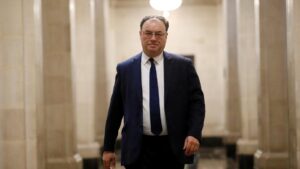
The governor of the Bank of England has said there could be a “rapid” fall in inflation in Britain amid a drop in global energy prices over recent weeks but warned that a shortage of workers could still pose major risks amid the cost of living crisis.
Andrew Bailey told MPs on the Commons Treasury committee that the UK’s rate of inflation could fall back substantially this year after hitting the highest levels since the early 1980s during the autumn after Russia’s invasion in Ukraine led to an increase in wholesale energy costs.
“The biggest single reason inflation has risen to that level is the war in Ukraine. It is also the most likely reason that we’re going to see a rapid fall in inflation in the year ahead, because we are not seeing energy prices rising further. In fact, they’re coming down,” he said.
The headline rate of annual inflation as measured by the consumer prices index fell back to 10.7% in November from a 41-year high of 11.1% a month earlier. Official figures for December, due on Wednesday, are expected to show a further modest decrease to 10.6%. That would still be well above the Bank of England’s 2% target.
Answering questions from MPs on the stability of the UK’s financial system, Bailey said a risk premium on UK assets seen in the wake of Liz Truss’s disastrous mini-budget in September was now “pretty much gone”, although cautioned that confidence in the UK remained fragile.
“It’s going to take some time to convince people that we’re back to normal,” he said.
The Bank’s governor confirmed it made a profit of about £3.8bn from selling government bonds bought in the emergency intervention in financial markets used to smooth over the turmoil of the mini-budget. The cash would go to the Treasury, he added.
His comments come as the Bank considers raising interest rates for the 10th time in a row early next month, with City investors anticipating a further increase from the current base rate of 3.5% as it looks to weigh up the risk of a recession with the need to combat inflation.
Rishi Sunak has also pledged to halve the inflation rate this year. Forecasts made in November by the Office for Budget Responsibility, the Treasury watchdog, suggest inflation is on track to drop below 4% by the end of the year.
Wholesale gas prices have fallen in recent weeks as mild weather and high levels of gas storage this winter have allayed some concerns over future shortages of Russian gas, with the potential to push down household bills. However, energy costs are still far higher than in recent years.
Bailey warned that an exodus in the British jobs market since the Covid pandemic could stand as the biggest risk to inflation remaining persistently higher for longer than expected.
“The major risk to inflation coming down … is the supply side, and in this country particularly the question of the shrinkage of the labour force,” he said.
Read more:
UK inflation could fall rapidly as energy prices drop, says BoE boss

